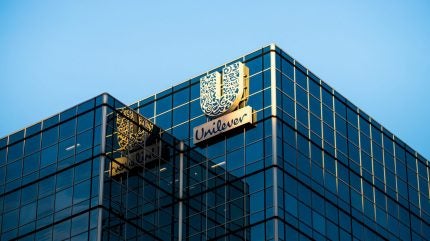
Trian Partners, an activist investor in New York, has reportedly acquired a stake in Unilever, which is grappling with the fall-out of a failed bid for GlaxoSmithKline’s consumer health business.
Outlets including Reuters and CNBC, citing unnamed sources, said Trian, led by billionaire businessman Nelson Peltz, has built a stake in the London-listed FMCG giant. The Financial Times, which first reported the development, noted its sources had not provided the size of the investment nor when it began. The Wall Street Journal, however, said Trian started buying Unilever shares ‘well before’ the GSK bid.

Discover B2B Marketing That Performs
Combine business intelligence and editorial excellence to reach engaged professionals across 36 leading media platforms.
Unilever revealed last week it would not increase its GBP50bn (US$67.7bn) offer for GSK’s consumer health business, a bid the target company said was undervalued.
Sections of the investor community were critical of Unilever’s interest in the GSK assets. There has also been debate over Unilever’s new “strategic direction”, in which the group wants to “materially” expanding the company’s presence in health, beauty and hygiene.
While the GSK bid stalled, there has been speculation Unilever may still pursue acquisitions in the target areas, which may come at the expense of offloading some parts of the foods and refreshment division to raise appropriate funds.
Jope explained last week: “The primary criteria for disposals would be the long-term, intrinsic growth rate of the business. We have an excellent foods and refreshment business with global, leading positions. You will have noticed that it’s performed well during the pandemic but it is true that foods and refreshment’s long-term growth profile has been below other parts of the portfolio.”

US Tariffs are shifting - will you react or anticipate?
Don’t let policy changes catch you off guard. Stay proactive with real-time data and expert analysis.
By GlobalDataHe added: “What we’re trying to land today is the setting out of our future strategic direction into health, beauty, and hygiene. We have no immediate plans to separate F and R [foods and refreshment] but rotation of our portfolio is part of upgrading into higher-growth spaces.”
Martin Deboo, an analyst at investment bank Jefferies, wrote in a follow-up note yesterday (23 January) Trian is known for building stakes in businesses in the region of 1-3.5%, noting the investor’s previous involvement in Cadbury, Kraft Heinz, PepsiCo, and more recently consumer goods firm Procter & Gamble (P&G).
Deboo said Jefferies anticipates “a positive share price reaction and a further upping of the temperature in the market debate on Unilever, where we expect Trian to argue for a foods and HPC split, in line with our core thesis”.
He added: “Trian has a long and successful track record of unlocking value. This has frequently centred on splits and spin-outs. Its one previous involvement in UK staples, with Cadbury plc in 2007, prompted a split into confectionery and soft drinks and concluded with a listing of soft drinks and an eventual take-out of confectionery by Kraft. Trian then argued successfully for splitting Kraft into Kraft Heinz and Mondelez.
“At P&G, Trian didn’t argue for a split, but instead for organisational change and performance improvement, centred on a lively proxy fight for a board position. This was successful and resulted, ironically, in a notably constructive partnership between Peltz and then P&G CEO David Taylor. However at PepsiCo, Trian was unsuccessful in its fight to engineer a split between drinks and snacks.”
Terry Smith, the CEO and co-founder of London-headquartered Fundsmith Equity, has upped the ante against Unilever having previously claimed the FMCG heavyweight had “lost the plot”, jumping on Hellmann’s as a case in point, describing Unilever as “labouring under the weight of a management which is obsessed with publicly displaying sustainability credentials”.
On Friday, he weighed into Unilever’s management again, arguing Unilever’s management should focus on improving the performance of its current business “before taking on any more challenges”.
Smith added: “Unilever’s performance has been poor. It is the worst performer by a considerable margin amongst the multinational FMCG companies we have owned and not just in terms of share price but also in terms of sales growth.
“The company would have us ignore this long-term underwhelming performance and talks about sales growth for the nine months ended September 2021 being their fastest for eight years. The irony is that foods and refreshment, the business they planned to sell if they were to buy GSK Consumer, outperformed the rest of the business, the one they wanted to materially expand, two to one.”
“Apart from observing that one swallow doesn’t make a summer and a few quarters of growth do not amount to a satisfactory track record, we would also suggest that Unilever shouldn’t seek long-term shareholders if it doesn’t want them to judge its long-term performance.”
Smith continued: “Five years ago, Kraft Heinz bid $50 (GBP36.50) per share for Unilever. Whilst we have never been Kraft Heinz shareholders and are not fans of their business model, Unilever surely needs to address the fact that five years later the share price is only at the level of that bid. The annualised return on the MSCI World Index over the same period is 12.5%. Why then should we trust this management and board with preserving value for shareholders?”
Deboo claimed on Sunday Trian may push for disposals in foods and refreshment.
“We have long been of the view that the right path to unlock value at Unilever is via a faster rate of disposals from its slow-growing foods businesses, or a separation between foods & HPC, via a sale or spin,” Deboo said. “We think that Trian might take a similar view. Particularly as Unilever’s recent further de-rating, in the aftermath of the GSK bid, has widened the potential gap between a holistic and sum-of-the-parts valuation.”





